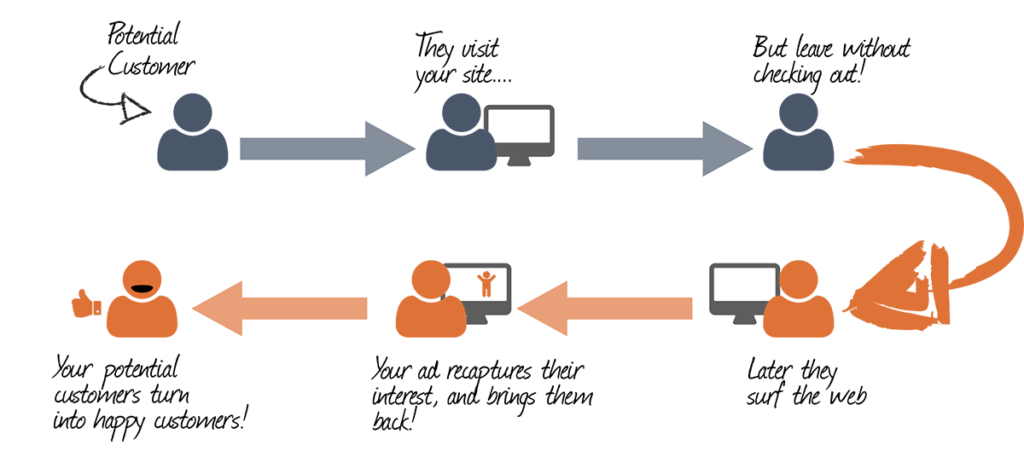Internet is a busy place, and ever since the coronavirus pandemic began, it has become busier and noisier. A myriad of business has gone online – from the kitchen to bathroom supplies and hair extensions to skin solutions. What is it that the Internet doesn’t sell?
However, it’s fairly difficult for a business to thrive in the pool of competitors. There is a combination of reasons that differentiate a successful business compared to one that failed. However, when it comes to growing and scaling a business, one of the key success factors is having the right marketing strategy.
The foundation of any successful business lies in the right marketing strategy. Therefore, today we’ll cover two of the most discussed and controversial topics of successful marketing campaigns i.e., Remarketing and retargeting.
What’s the Difference between Remarketing and Retargeting?
While many tend to define remarketing and retargeting as the same thing, I would respectfully disagree.
Both the terms stem from digital marketing with the same set goals but different marketing strategies.
To simply put,
Retargeting is the subcategory of remarketing and both lead to one said goal, i.e., sales conversion.
Let’s dig into this further,
Suppose you’ve started an online business and hired core team members of developers and marketers. Now, what do you expect from your online store in return?
To sell like hot cakes on the Internet, right?
Well, sorry to burst your bubble, but it’s not as simple as that. For making sales, you need to turn your prospects into customers.
The question remains, how?
By marketing your products or services to the targeted audience.
And therefore, your business needs the creative marketing duo to skyrocket your sales and increase ROI.
The terms remarketing and retargeting are usually used interchangeably, but there’s a major difference you need to know:
What is Remarketing?
Remarketing is a way to connect with people who have already visited your website via email campaigns.
In business, remarketing is not a tough grind. It’s just a coaxing ritual to attract your potential customers to take the action you want.
In simpler words, remarketing is a tool for bending people to your creative will via popular remarketing channels such as email campaigns, newsletters, and social media.
What is Retargeting?
Retargeting is a way to connect with an audience through targeted ads or banners on the Internet.
Suppose you’re interested in buying a coffee mug.
You go to google and search for the best coffee mugs available on the Internet. Google graces your search feed with 100+ online stores that are selling your desired item.
You pick store XYZ, add your favorite cup to the cart, and boom… Your phone battery dies. What a disappointment!
Surprise, surprise!
Upon switching on your phone, you notice the product everywhere.
Mind-boggling enough?
Well, not really.
Retargeting is the jam here.
So, retargeting is the marketing approach when brands display ads or banner ads to target an already interested individual.
Now that you know the key difference between remarketing and retargeting, let’s delve into the technicalities.
How Does Remarketing Work?
Remarketing works on the principles of the very conventional, old school yet effective marketing medium, i.e., email campaigns.
Let’s face it, the emails you still receive in your inbox are tempting enough to take some action. (Whether you add things to the cart).
That’s exactly the goal of remarketing. To engage with potential customers through captivating emails, newsletters, or social media channels.
Basically, remarketing targets the customers that are already connected to your brand one way or another. Your job is to attract the customers with something more exciting than their previous purchases- an updated version of the product or a discount code on their next purchase.
Anything that entices the customers to go back to your website and make a purchase.
The three most common types of remarketing campaigns are through:
- Social Media, particularly Facebook or Instagram
- Email campaigns
- Abandoned carts reminder.
The science behind remarketing has evolved over time. Through Facebook remarketing, you can target a custom audience defining their gender, age, and interests to control who engages with your brand. It lets you to maximize your reach to people who might be interested in your brand, so their chances of purchasing from you are high.
Fun Fact: Facebook remarketing ads get 3x the engagement than regular Facebook ads!
How Does Retargeting Work?
Retargeting works on the principles of cookies.
Yes, the “cookies” that cites your information through retargeting pixel, which is just a snippet of code.
A retargeting pixel places a cookie inside the visitor’s browser and saves their information in your Google Analytics, Facebook, Twitter, or Instagram business accounts.
Later, it allows you to target a particular group of customers who might be interested in your products or related products, which makes converting a lot easier.

Source
However, retargeting is further divided into:
- Direct retargeting
- Indirect retargeting
Direct Retargeting
In direct retargeting, you target customers who’ve already visited your website and showed interest in your products.
In case if they didn’t convert, you were able to track them as you have already placed cookies in their browsers. Now, you can use Google Ads to reengage with these users across the web.
Indirect Retargeting
Internet is a pool of information. And not just for the customers, but for businesses as well.
With the help of cookies, businesses can access a ginormous database of users including their interests, habits, likes, dislikes, and whatnot.
Sounds spooky, but this is how digital marketing works!
And Google knows where to use this information. So, with the help of third-party cookies, it knows exactly who likes what, why, and where.
And that’s how you can indirectly target the customers that haven’t visited your website before but truly interested in your services or products.
Which strategy should you choose?
Since you know the difference between remarketing and retargeting, the next question arises, what’s better?
Well, both are excellent approaches to convert sales. Retargeting and remarketing are established ways to target the audience that is highly interested in your products and most likely to convert.
Remarketing is an excellent tool that allows you to reengage with your existing loyal customers through email campaigns, and retargeting is a way to target the audience that is more likely to convert. Therefore, if use properly, both strategies let you to maximize the return of your marketing dollars.
Conclusion
Even though the goal of remarketing and retargeting is the same, the differences are clear. For businesses, remarketing is going after your existing customers to promote more products or an updated version of the original product. On the other hand, retargeting is going after the users who have shown interest in your products, or shoppers who have abandoned their carts before crossing the line. Therefore, driving a higher sales conversion.
No matter what business and the niche you’re in, leveraging these two popular marketing tactics will allow you to generate more sales and revenues, ultimately increasing conversions and ROI.
What is your experience with remarketing and retargeting? Share your thoughts with us in the comment section below.
Enjoy this article? Subscribe to get similar articles delivered to your inbox and don’t forget to share it with your friends.
Alan Lo, Managing Partner of Stratwell Strategic Solutions, brings a decade of entrepreneurial and business development experience. Early in his career he was instrumental in building out the distribution channels of a real estate investment firm with over $2 billion in AUM. He has then founded an investment company in 2014 which he successfully exited in 2019.













2 Comments
This website is really nice, I visit it regularly. Thanks!
Thanks for the feedback Yolanda!